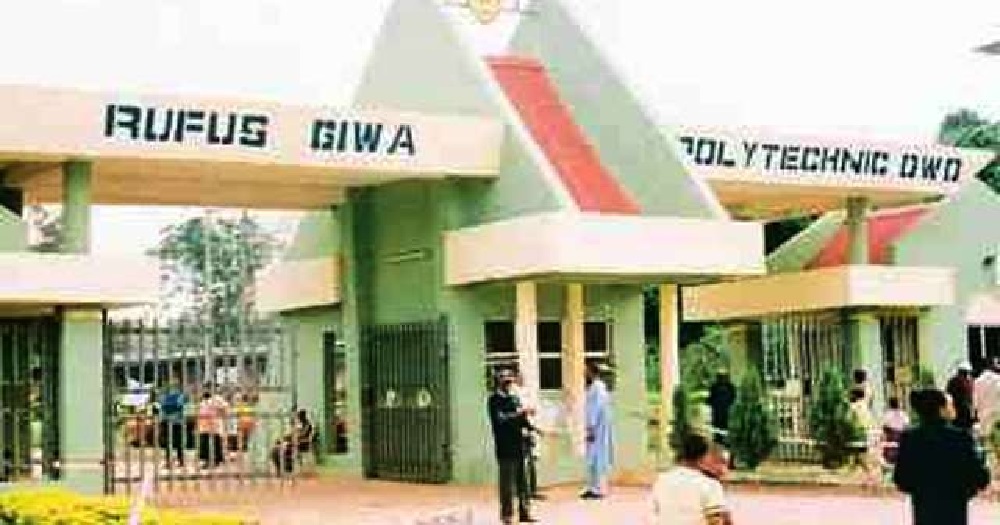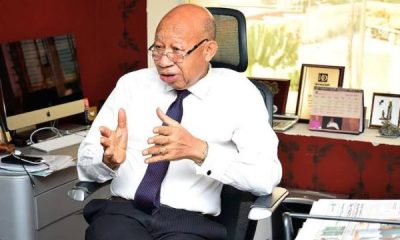News
Tinubu Orders Disbursement Of N155bn For Foodstuff Purchase Nationwide

President Bola Tinubu has ordered the purchase and sale of foodstuff worth N155 billion to be distributed across the nation.
The President gave the approval during the National Economic Council (NEC) meeting on Thursday in Abuja where he urged state governors to work together to meet the needs of citizens.
He said he is willing to provide the needed support to ensure that Nigerians are relieved of hardship, according to a statement by presidential spokesman, Ajuri Ngelale.
“President Bola Tinubu has approved the immediate rollout of the National Construction and Household Support Programme to cover all geo-political zones in the country,” the statement read.
“Other items under the National Construction and Household Support Programme include deployment of N155 billion for the purchase and sale of assorted foodstuff to be distributed across the nation.”
Tinubu also approved the delivery of a N50,000 uplift grant each to 100,000 families per state for three months.
Food Production
Tinubu emphasized the urgency of boosting food production, noting that the Sokoto-Badagry Highway is a pivotal project as the states within this axis form the food belt of the nation, with Badagry being an important artery for food export.
“Our states must work together to deliver on the critical reforms required of us to meet the needs of our people. Time is humanity’s most precious asset. You can never have enough of it. It is getting late.
“We are ready and able to support you in the form of the mechanization of your agricultural processes and the provision of high-quality seedlings.
“We are prepared to provide solar-powered irrigation facilities to support our farmers across seasons, but we must now produce. We must produce the food our people eat, and it will require coordination and intentionality between members of the National Economic Council (NEC).
“There is nothing we are doing that is more important than producing high-quality food for our people to consume, buy, and sell. We create jobs in the production of it. And that is before we generate wealth by exporting the excess. It is not beyond us to achieve this for Nigerians.
“How much support do you need from me and in what form? I am prepared to provide it. But we must achieve the result. We must deliver on our targets at all levels. Please report back following your consultations and submit to my office within seven days,” President Tinubu said.
See the full statement below:
PRESIDENT TINUBU URGES GOVERNORS TO MEET TARGETS ON FOOD SECURITY; APPROVES IMMEDIATE ROLLOUT OF NATIONAL CONSTRUCTION AND HOUSEHOLD SUPPORT PROGRAMME
To boost agricultural productivity, strengthen the economy by creating opportunities in the real sectors of agriculture, manufacturing, and construction, as well as provide urgent economic relief for Nigerians, President Bola Tinubu has approved the immediate rollout of the National Construction and Household Support Programme to cover all geo-political zones in the country.
Under the programme, the Sokoto-Badagry Highway, which will traverse Sokoto, Kebbi, Niger, Kwara, Oyo, Ogun, and Lagos, is prioritized.
Other road infrastructure projects, such as the Lagos-Calabar Coastal Highway, which is underway, and the Trans-Saharan Highway, which links Enugu, Abakaliki, Ogoja, Benue, Kogi, Nasarawa, and Abuja, are also prioritized.
The President has also approved full counterpart financing for Port Harcourt-Maiduguri Railway; to traverse Rivers, Abia, Enugu, Benue, Nasarawa, Plateau, Bauchi, Gombe, Yobe and Borno, as well as for the Ibadan-Abuja segment of the Lagos-Kano Standard-Gauge Railway; which will traverse Lagos, Ogun, Oyo, Osun, Kwara, Niger, Abuja, Kaduna, and Kano.
The Sokoto-Badagry road project is specially prioritized for its importance as some of the states it will traverse are strategic to the agricultural sustainability of the nation.
Within the Sokoto-Badagry Highway corridor, there are 216 agricultural communities, 58 large and medium dams spread across six states, seven Special Agro-Industrial Processing Zones (SAPZs), 156 local government areas, 39 commercial cities and towns, and over 1 million hectares of arable land.
In addition, other items under the National Construction and Household Support Programme include:
(1) One-off allocation to states and the Federal Capital Territory of N10 billion for the procurement of buses and CNG uplift programme.
(2) Delivery of N50,000 uplift grant each to 100,000 families per state for three (3) months.
(3) Provision for labour unions and civil society organizations.
(4) Deployment of N155 billion for the purchase and sale of assorted foodstuff to be distributed across the nation.
Speaking during the National Economic Council (NEC) meeting on Thursday in Abuja, President Tinubu urged state governors to work together to meet the needs of citizens, stating that he is willing to provide the needed support to ensure that Nigerians are relieved of hardship.
While emphasizing the urgency of boosting food production, the President noted that the Sokoto-Badagry Highway is a pivotal project as the states within this axis form the food belt of the nation, and with Badagry being an important artery for food export.
“Our states must work together to deliver on the critical reforms required of us to meet the needs of our people. Time is humanity’s most precious asset. You can never have enough of it. It is getting late.
“We are ready and able to support you in the form of the mechanization of your agricultural processes and the provision of high-quality seedlings.
“We are prepared to provide solar powered irrigation facilities to support our farmers across seasons, but we must now produce. We must produce the food our people eat, and it will require coordination and intentionality between members of the National Economic Council (NEC).
“There is nothing we are doing that is more important than producing high-quality food for our people to consume, buy, and sell. We create jobs in the production of it. And that is before we generate wealth by exporting the excess. It is not beyond us to achieve this for Nigerians.
“How much support do you need from me and in what form? I am prepared to provide it. But we must achieve the result. We must deliver on our targets at all levels. Please report back following your consultations and submit to my office within seven days,” President Tinubu said.
Chief Ajuri Ngelale
Special Adviser to the President
(Media & Publicity)
June 27, 2024
News
A’Court reserves judgment on Kano LG poll dispute

A special panel of the Court of Appeal sitting in Abuja has reserved judgment in five separate appeals arising from the legal disputes surrounding the conduct of the 2024 local government elections in Kano State.
The appeals stem from two rulings delivered by the Federal High Court in Kano, which, among other declarations, nullified the composition of the Kano State Independent Electoral Commission.
The cases include Appeal No. CA/KN/20/2025, filed by KANSIEC with the Independent National Electoral Commission and four others listed as respondents.
Another, CA/KN/233/2024, was filed by the Kano State House of Assembly and another party, with Aminu Aliyu Tiga and 14 others as respondents.
Appeal CA/KN/290/2024 was brought by the Attorney General of Kano State and six others against the All Progressives Congress and three others.
Additionally, Appeal CA/KN/291/2024 was filed by KANSIEC and eight others, with the Kano State House of Assembly and six others listed as respondents.
In the appeal marked CA/KN/233/2024, the Kano State House of Assembly and another appellant, represented by Chief Adegboyega Awomolo (SAN), urged the appellate court to overturn the judgment of the Federal High Court, which had barred KANSIEC from conducting local government elections.
Awomolo argued that the Federal High Court lacked jurisdiction to entertain the case, noting that the suit filed by Aminu Tiga and the APC was statute-barred at the time of filing.
He also contended that the plaintiffs lacked the legal standing to initiate the case.
Justice Simon Amobeda of the Federal High Court had, on October 22, 2024, restrained KANSIEC from conducting elections in the 44 local government areas of Kano State.
The judge ruled that the electoral commission’s members were card-carrying members of the ruling New Nigeria People’s Party, in breach of Sections 197 and 200 of the 1999 Constitution.
Justice Amobeda further directed INEC not to release the national voters’ register for the purpose of the local government elections in the state.
Additionally, he barred the police, the Department of State Services, and other security agencies from providing support or protection for the polls.
Unhappy with the verdict, the Kano State House of Assembly and other affected parties approached the Court of Appeal, arguing that local government election matters are under the exclusive purview of the state and can only be adjudicated by a Kano State High Court—not the Federal High Court.
After hearing all arguments on Tuesday, the three-member appellate panel led by Justice Georgewill Ekanem announced that judgment had been reserved and would be delivered on a date to be communicated to the parties involved.
News
Ondo poly workers commence strike action over unpaid wages

Workers at the Rufus Giwa Polytechnic, Owo, in Ondo State on Tuesday embarked on an indefinite strike over the non-payment of salaries by the Ondo State Government.
The striking workers, who are members of the Non-Academic Staff Union and the Senior Staff Association of Nigeria Polytechnics, staged a peaceful protest on the institution’s campus to express their grievances.
The aggrieved staff revealed they are being owed six months’ salaries and accused the government of failing to implement the national minimum wage.
They carried placards with messages including, “We are hungry, pay our six months’ salaries,” “Mr Governor, please implement our 2025 budget,” and “Acting Rector, please clear our 2022, 2023, and 2024 promotion arrears.”
During the protest, the Chairman of NASU, RUGIPO chapter, Mr. Julius Olugbenga-Aro, and his SSANIP counterpart, Mr. Saka Olokungboye, called on Governor Lucky Aiyedatiwa to urgently address the workers’ demands.
They lamented the hardship faced by their members, saying many are unable to meet basic needs due to the unpaid wages.
Olugbenga-Aro stated, “This protest is to express our frustration over the non-payment of six months’ salary arrears and the failure of the Ondo State Government to implement the national minimum wage for polytechnic staff.”
While acknowledging some of the governor’s developmental efforts at the institution, including the recent approval for the polytechnic’s conversion to a university, the union leaders appealed for more urgent actions.
They urged the state government to approve immediate payment of the outstanding salaries, ensure full implementation of the 2025 institutional budget, and begin payment of the new national minimum wage.
They also warned that failure to act swiftly could result in prolonged disruptions to the academic calendar, further affecting students and the institution at large.
News
Court imposes N100m damages penalty on Abuja school over student’s death

A Federal Capital Territory High Court in Abuja on Tuesday awarded the sum of N100m in general damages against Louisville Girls Secondary School, Gwagwalada, for negligence of duty of care which led to the death of a student.
Mr Ifeanyi Ikpeatusim had sued the school for negligence that resulted in the death of his 9-year-old daughter, Kamzie,
In the suit marked CV/1738/18, Ikpeatusim alleged that the school’s failure to provide adequate medical attention after Kamzie who fell ill shortly after her admission and resumption in the school led to her untimely death.
Kamzie, who was admitted as a boarding student in September 2017 became severely ill by October 2 and died a few days later.
Justice Sylvanus Oriji, while delivering judgment in the suit brought before the court after awarding the N100m cost, ordered a 10 per cent interest on the judgment sum from April 8 until full payment.
He also awarded an additional N300,000 as the cost of the suit.
Justice Oriji while pronouncing the decision of the court, held that the evidence presented showed the school and its agents acted negligently by failing to attend promptly and adequately to Kamzie’s medical needs.
“The claimant established his allegations of negligence against the school.
“There is no amount of money that can bring back the child to life,” he stated.
Justice Oriji however acknowledged the fact that one significant outcome of the case was the improvement of the school’s sickbay following the incident.
He noted that the presence of doctors attending to students twice daily was a commendable development.
While the claimant had asked the court to order the school to name one of its structures in Kamzie’s name in her honour, Justice Oriji noted that the improvement in the school’s sickbay was sufficient enough to know the school is making amends from its mistake.
“The court thinks that the improvement in the sickbay, ensuring doctors are available twice daily, is in honour of Kamzie, as part of reforms recommended by her family.
“The claimant should take solace in the fact that Kamzie has been honoured by the school through these improvements.”
-

 News11 hours ago
News11 hours agoOERAF held memorial lecture on conflict resolution, security/safety of community in Nigeria
-

 News20 hours ago
News20 hours agoJust in: Founder of Diamond Bank and ex-chairman of MTN, Paschal Dozie is dead
-

 News16 hours ago
News16 hours agoTRADE WAR! U.S. angry over Nigeria’s import ban on 25 products
-

 News21 hours ago
News21 hours agoNaira Nosedives Against Dollar
-

 Sports20 hours ago
Sports20 hours agoReal Madrid keeping tabs on Victor Osimhen
-

 News16 hours ago
News16 hours agoINTERVIEW: Introduction of Child Rights Curriculum In Nigerian Universities Will Take CRA to Families – Dr Obiorah Edogor
-

 News21 hours ago
News21 hours ago2Baba’s Lover Natasha Osawaru Fired As Edo Assembly Minority Leader
-

 News20 hours ago
News20 hours agoOERAF Executive Director Dr Akpodiete, Held Memorial lecture on Essence and benefits of health insurance+Photos





